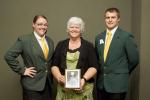FRUITLAND, Mo. – Fall-calving Show-Me-Select bred replacement heifers averaged $1,822 at the Fruitland (Mo.) Livestock Auction, Saturday, May 4.
The 232 heifers sold were from almost 1,000 heifers that consignors enrolled in the yearlong breeding development program coordinated by University of Missouri Extension. Some heifers did not meet SMS standards, but most developed heifers were kept in home herds, said Roger Eakins, Jackson, regional livestock specialist.
Bidding was sluggish at times; however, longtime consignors sold well, some topping the sale.
“Talk in the barn prior to the sale was of uncertain weather and costly winter feeding,” said Dave Patterson, MU Extension beef specialist.
Eakins added that producers were still buying hay, awaiting growth of late-spring grass.
The top-selling heifer, a registered Angus, brought $3,300 for Rick Eggers, Jackson, Mo. He sold 12 head at an average of $2,138 per head.
Masters Farms, Cape Girardeau, had the second-high average on 26 head at $2,085.
Dan and Colleen Jarvis, Arcadia, Mo., had third-high average of $2,038 on eight head.
Repeat buyers, coming to buy from reputation herds, help build sale averages, Patterson said.
A story is developing at the sale on the value of proven genetics.
Two-thirds of heifers in the sale were bred by artificial insemination (AI). The 151 AI heifers averaged $1,867, a premium of $131 over the bull-bred heifers.
Longtime breeders now consign Tier Two AI heifers. The 30 head of Tier Two averaged $2,087, a $351 premium over all bull-bred heifers.
Tier Two heifers are out of proven sires and are bred to highly proven sires. Bulls approved for Tier Two breeding have higher accuracy in expected progeny differences (EPDs).
“Heifer buyers learn the value of proven genetics,” Eakins said. “Proven sires may have thousands of progeny in herds. Buyers know what calves will look like and be assured of how they will perform.”
Few natural-service herd bulls have production-proven calf records.
“Through Show-Me-Select, producers are learning the value of high-accuracy proven sires,” Patterson said. Sire catalogs from AI companies show EPD records on their sires.
“Any producer can have access to top sires in any breed for the price of a straw of semen,” he said. “Quality premiums more than pay for AI costs.”
Now, more heifers are results of fixed-time AI. All cows in a herd can be bred on the first day of breeding.
Since 1997, 105,000 bred heifers have been sold through the Show-Me-Select sales. “The largest value has been to herds enrolled in the program that keep heifers to improve genetics in their own herd,” Patterson said.
Surplus heifers from those herds are sold in six regional sales each year. Two sales of fall-calving heifers are held in southern Missouri each spring.
Fall sales of spring-calving heifers are in Fruitland, Joplin, Kingsville and Palmyra, Mo. Sales are organized by local farmers.
The next sale will be 7 p.m., Friday, May 17, at Joplin Regional Stockyards, Carthage, Mo.
SMS provides more than breeding and genetics. Heifers are enrolled a year ahead. They undergo pre-breeding exams by veterinarians. That includes scoring reproductive tracts and measuring pelvic areas.
Initially, major emphasis went to calving ease. That reduced death loss of newborn calves and first-calf heifers. With fewer calving difficulties, more heifers re-breed on time for a second calf.
The program includes management of heifer health and nutrition. All instructions for Show-Me-Select heifers are included on a two-sided guide that is updated each year.
Guides are available from regional livestock specialists at county extension centers.
“You are lucky to have livestock specialists who know this program,” Patterson told the crowd at the auction. “Other states see what you have and want to start their own programs.” Now, the program is limited to Missouri producers.
Buyers are welcomed from across the country. Show-Me-Select heifers have sold into 17 states. At Fruitland this year, nine of 55 buyers were from out of state. They came from Arkansas, Illinois and Kentucky.
The program continues to grow in Missouri. More sales may be added this fall in northern Missouri.
Eakins recalled the first sale 15 years ago. The average price per heifer was $864. “We thought that was outstanding.”
Producers found they can add growth genetics while getting smaller birth weights. By adding marbling genetics, more calves grade choice and prime, which bring higher premiums at the packing plant.
MU Extension added a program, in cooperation with the beef industry, to capture the value of the heifers’ steer mates. “Quality Beef by the Numbers” adds marketing to bring quality premiums back to farms of origin.
Read more http://extension.missouri.edu/news/DisplayStory.aspx?N=1824





